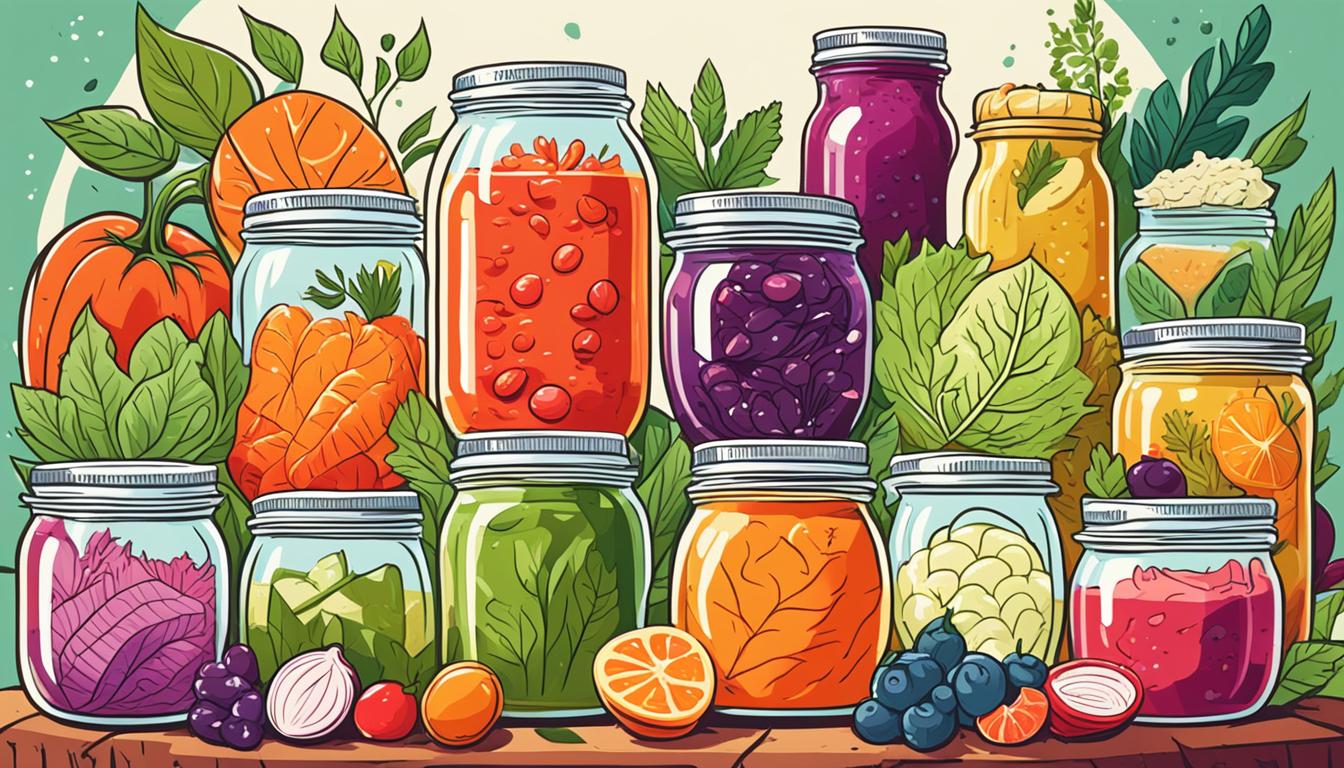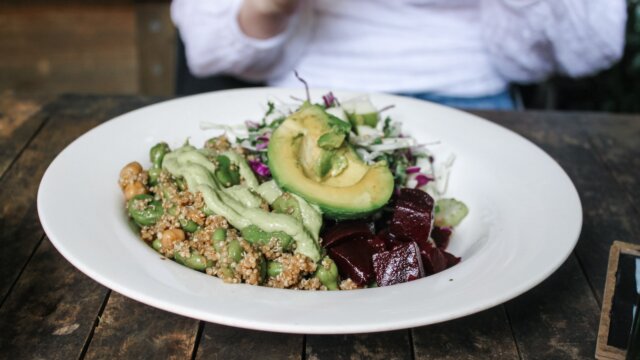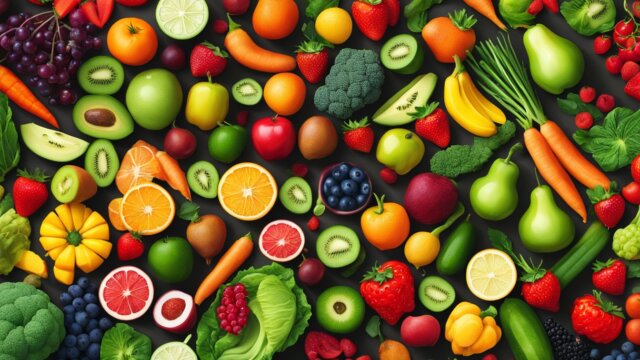FTC disclaimer: This post may contains affiliate links and we will be compensated if you click on a link and make a purchase.
Did you know a 2021 study by Stanford’s School of Medicine showed how a 10-week diet changed healthy adults’ gut bacteria? This shows how strong an effect fermented foods have on our gut health. They provide great tastes and can really improve how we feel.
Caring for our gut is crucial. It’s home to trillions of tiny organisms that affect our health. A bad gut can cause bloating, constipation, skin issues, and more.
So, it’s smart to focus on it and choose our meals carefully. Fermented foods are tasty and bring many health perks, changing our well-being for the better.
They have been used for ages to keep food and add flavors. Now, they are praised for boosting our gut, immunity, and health overall.
Key Takeaways
- Fermented foods can reshape the gut microbiome and offer numerous health benefits.
- Incorporating a variety of fermented foods like yogurt, kefir, sauerkraut, and kimchi can support a healthy gut.
- Fermented foods are pre-digested by bacteria, making them easier to break down and absorb.
- Fermentation can increase the bioavailability of nutrients like vitamins B and C.
- Moderation is key, as overconsumption of fermented foods can lead to excessive intake of salt, sugar, or alcohol.
The Gut: Where Health Begins
The human gut is filled with trillions of microorganisms. These tiny beings make up the gut microbiome. It is key to our health and feeling good. An unbalanced gut can cause problems like bloating, constipation, and even mental health issues.
Trillions of Microorganisms in the Gut
Inside our gut, there’s a complex system of bacteria, fungi, and microbes. They break down food, make vitamins, and keep the immune system in check. A diverse and healthy gut is vital for our overall wellness.
Signs of an Imbalanced Gut Microbiome
An off-balance gut can cause trouble. You might experience bloating, constipation, or skin problems. Mental health could also suffer. These issues impact how we feel day to day.
The Importance of Gut Health
Our gut is like a second brain, closely linked with our nervous system. It’s where our health journey begins, vital for immune strength and absorbing nutrients. A healthy gut helps prevent many health problems.
Fermented Foods: Boosting Gut Microbial Diversity
Adding fermented foods to your meals can make you healthier. They are proven to add many types of good bacteria to your gut. This can lower swelling and make your body’s defense system work better.
A 2021 study found that eating certain fermented foods for 10 weeks changed the gut bacteria in healthy adults. The more fermented foods you eat, the more you help your gut.
Scientific Evidence for Fermented Foods
Stanford experts tested 36 healthy people. The participants ate either fermented foods or high-fiber foods for 10 weeks. Those who ate more fermented foods saw a better mix of bacteria in their gut.
This was especially true if they ate a lot of fermented foods. Eating yogurt, kefir, and other foods like that also reduced swelling and made some parts of the immune system less reactive.
After the study, 19 chemicals that cause swelling, like interleukin 6, were lower in those who ate fermented foods. This shows eating fermented foods can make you healthier by changing your gut and lowering swelling.
Remodeling the Gut Microbiota
A group of 36 adults took part in a 10-week test. One team ate more plant foods rich in fiber. The other group added more fermented foods to their diets. The fiber-eating group increased their daily intake a lot, the fermented-food group ate up to six servings a day.
After the 10 weeks, the people eating fermented foods showed much lower rates of swelling, including key signs of long-term swelling.
The adults who ate more fermented foods still saw benefits four weeks after stopping their diet. But, scientists found that the big change in the variety of bacteria in their guts wasn’t only from the food. This could mean our bodies change in a good way just by being around different types of bacteria.
Not all the new bacteria came directly from the fermented foods, though. This is important and brings up more questions for future research.
Fermented foods are getting more attention for their health benefits. A lot of experts are recommending them.
Lactic acid bacteria are especially helpful in making these foods. Around the world, you can find a lot of different types of fermented foods and drinks, each with its own mix of good bacteria and other microorganisms.
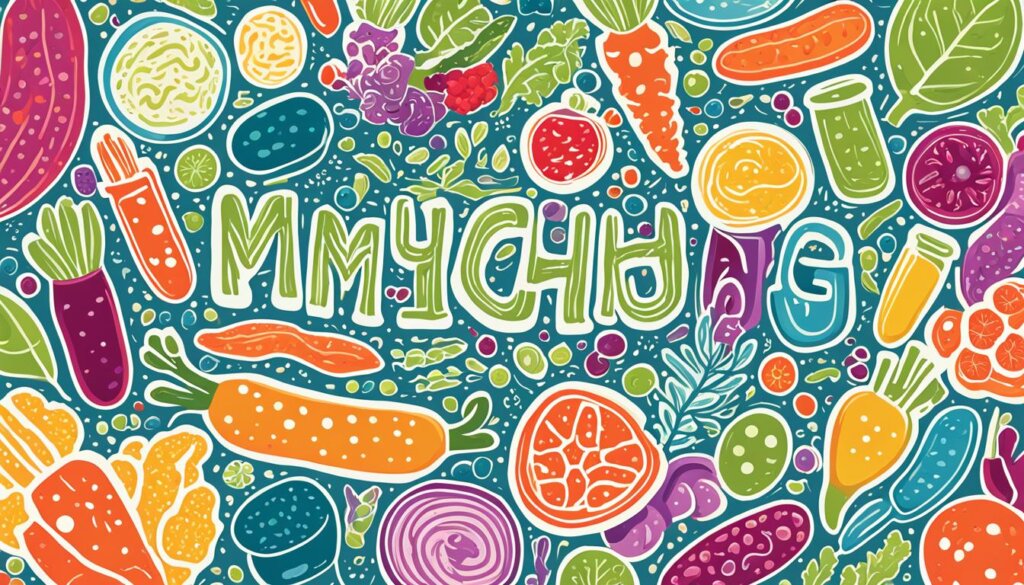
The Best Fermented Foods for Gut Health
Greek yogurt and kefir are some top picks for improving gut health. They are full of protein and live cultures. These help make your gut healthier.
Sauerkraut, from fermented cabbage, is packed with fiber. It also has antioxidants which are good for you. Kombucha is a fizzy drink that’s good for your gut. It helps with inflammation, cleans the liver, and balances your gut bacteria.
Kimchi: Korean Fermented Vegetable Delicacy
Kimchi is a Korean favorite for good reason. It can help keep your weight down. It also helps with blood pressure and tummy troubles.
Miso, a soybean paste, is another great choice. It has a special probiotic that fights off gut diseases. Tempeh, made from soy, is loved by vegetarians. It’s good for your blood sugar because it has a low impact on it.
Miso: A Fermented Soybean Paste
Miso is full of a probiotic that’s great for your gut. It lowers the risk of gut diseases.
Tempeh: A Protein-Rich Fermented Soy Product
Vegetarians really like tempeh. It’s low on the food scale, meaning it won’t spike your blood sugar.
Kefir: A Tangy Gut-Friendly Beverage
Kefir is a great way to add good bacteria to your diet. It helps with heart health by bringing down inflammation. Drinking kefir daily for 12 weeks boosted ApoA1, a good protein in your cholesterol.
Sauerkraut: Fermented Cabbage Goodness
Sauerkraut is fermented cabbage. It’s rich in fiber and antioxidants. It has plenty of healthy cultures for your gut. Plus, vitamins C and K, and anti-inflammatory stuff.
A study in 2018 found that sauerkraut’s good bacteria grows a lot during making. This bacteria stays strong even when the sauerkraut is packaged for sale.
Kombucha: A Fizzy Probiotic Drink
Kombucha is a fizzy drink that’s good for your gut. It fights off inflammation and helps detox your liver. Plus, it balances your gut bacteria.
In 2019, a study found that kombucha is full of antioxidants and helpful bacteria.
Greek Yogurt: A Probiotic-Rich Delight
Greek yogurt is a tasty way to get protein and good gut bacteria. It makes your gut healthier.
Yogurt that’s full of live cultures can survive your digestive system. The “Live & Active Cultures” seal means it has plenty of good bacteria. A single serving can have 17 billion cultures right when it’s made.
A review in 2021 linked eating yogurt to lower risks of cancer and several other health benefits. This includes a healthier heart, bones, and a better gut.
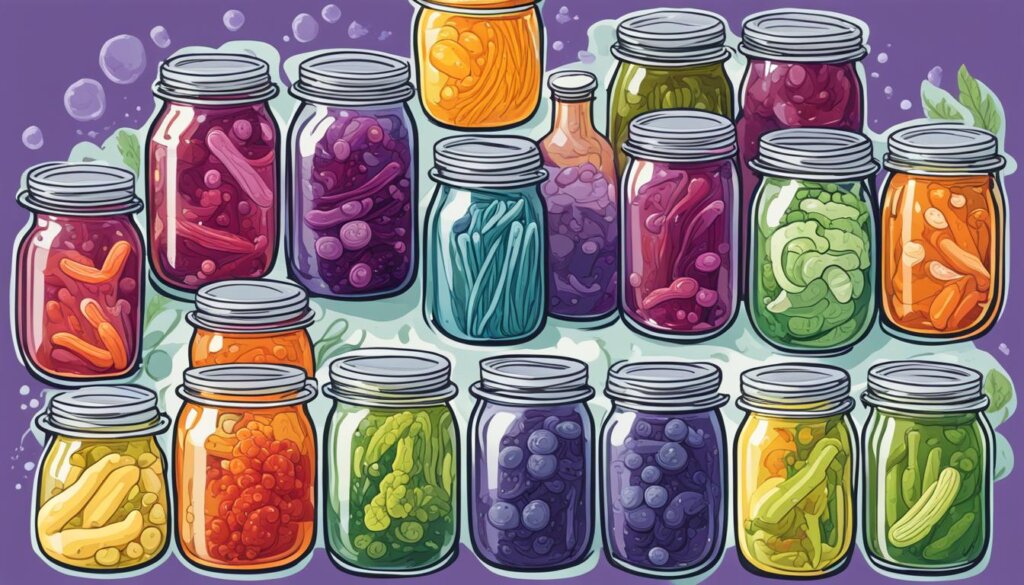
Fermented Foods: Enhancing Nutrient Absorption
Fermentation helps keep food fresh and boosts its nutrition. Microorganisms create enzymes during this process. These enzymes turn complex nutrients into easier forms for our bodies to use.
So, vitamins, minerals, and antioxidants in fermented foods are easier for our bodies to take in and use. Foods like kefir and yogurt get a boost in calcium and B vitamins through fermentation.

The nutrients in fermented foods become more available because complex molecules break down. This change also makes the foods better at fighting off harmful cells, boosting health. Kefir, sauerkraut, miso, and tempeh offer many nutrients. They’re a smart choice for your health when eaten regularly.
Eating more fermented foods can help your body get more nutrition. This leads to better use of vitamins, minerals, and antioxidants. It can boost how well your gut works and make you feel better overall.
Fermented Foods: Immune System Boosters
Your gut and immune system work closely together. Most of your immune system actually lives in your gut. A good gut microbiome is key for a strong immune response. The immune system has three key parts: what you eat, your gut cells, and the bacteria.
Eating fermented foods helps good bacteria grow and stops bad ones, keeping your immune system healthy. The bacteria in these foods make your gut work better. This leads to a stronger immune system and less swelling.
Fermented veggies turn into butyrate when they’re broken down by gut bacteria. Butyrate is a type of fat that helps your immune system work well. The mix of bacteria in your gut is really important for staying healthy.It might also affect how well your body fights off viruses.
But, we need more studies to know for sure. Veggies like cabbage help your immune system and keep your gut healthy. They can also help you fight off infections.
Studies have shown foods like kimchi and yogurt are good for you. They lower the chance of getting diabetes, help if you’re overweight, and fight off infections.
Bifidobacterium animalis can stop infections in your nose and throat. It also stops viruses from making more copies of themselves. Lactobacillus plantarum works against stomach bugs from COVID and lessens damage and swelling. Lactobacillus casei DN-114 001 makes you less likely to get sick and shortens how long an illness lasts.
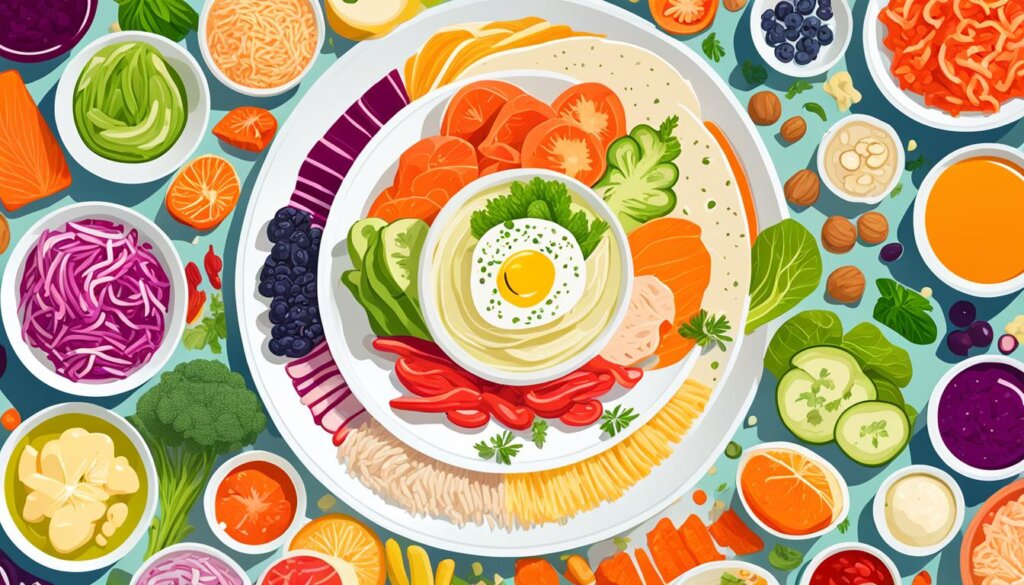
There are 10 types of sauerkraut and three kinds of kimchi by wildbrine. They help your immune system stay strong. We still don’t know for sure if fermented foods can fight off COVID-19.
Since February 2020, COVID-19 has spread to nearly 464 million people and caused over 6.06 million deaths. The virus can float in the air for up to 3 hours and infect during that time. It can last 4 hours on copper, 24 hours on cardboard, and 2-3 days on plastic or steel.
About 65% of airborne MERS-CoV, a similar virus, can still infect after an hour. There are about 120 efforts worldwide to make vaccines for COVID-19.
Kimchi is proven to lower bad cholesterol that can lead to heart problems. This could help with the effects of COVID-19 on the heart.
The Gut-Brain Connection
New research tells us that our gut health is linked to how we feel. The gut-brain axis is a two-way talk system between our gut and brain. It affects our mood, feelings, and how well we think.
The gut has more than 500 million nerve cells, a big number. This shows how important our gut is for not just digestion, but also our mind. It’s why many are looking into how fermented foods can help our mental health.
Fermented Foods and Mental Well-being
New clues show fermented foods can make the gut-brain axis happier. This might help us feel better mentally. Research points to a link between a healthy mix of gut bacteria and feeling less depression, anxiety, and other bad moods. This healthy state of gut germs interacts with the immune system and makes stuff that talks to our brain.
But we still need to know more. Yet, first looks show having a well gut is vital for feeling good in our brain and emotionally. Fermented foods are full of good bacteria, food for the bacteria, and active parts. They might be the secret to keeping our gut-brain axis in good shape and having better mental health.
Digestive Comfort with Fermented Foods
Many people face tummy troubles like bloating, gas, and stomach upset. Fermented foods are a great help. They make your gut work better. The friendly bacteria in these foods break down tough carbs and fibers. This breakdown keeps digestion smooth and easy.
Probiotics in fermented foods are key for a healthy digestion and strong immune system. These foods change the mix of bacteria in your gut. They crowd out the bad ones. Eating lots of different fermented foods helps a ton. It helps your gut, boosts nutrient use, strengthens your immunity, and might even make you feel happier.
Incorporating Fermented Foods into Your Diet
Start by adding small amounts of fermented foods to your meals. Rhian Stephenson suggests this. She’s a nutritionist and the founder of Artah. She says, “For a gentle start, use a bit a few times a week. Then, slowly have more over time.”
Start Slowly and Gradually Increase
Avoid fermented foods with lots of added sugar, color, or vinegar. These may not be good for your gut. To see what’s best for you, try different fermented foods. See which ones your gut likes the most.
Avoid Added Sugars and Preservatives
Studies show more and more people are interested in fermented foods. This is seen in many places worldwide. They show a variety of products and lots of ongoing research in this area.
Fermented Foods: A Diverse and Colorful Approach
It’s good to eat about 30 different plant foods a week for a healthy gut. The more types of plants you eat, the better your gut bugs feel. Nuts, seeds, pulses, whole grains, fruits, and veggies are full of good stuff for your gut. Foods like garlic, onion, leeks, and asparagus are great for your gut bugs.
Adding colorful fruits and veggies is smart, too. They have polyphenols that help your gut bugs. Eating nuts, berries, and dark chocolate gives you good antioxidants.
Balancing Fermented Foods and Gut Rest
Fermented foods are great for gut health. But it’s key to not overdo them. It’s vital to give your gut a break now and then. This break allows it to heal and clean itself. Imagine your gut like a team. At night, they all work hard to keep everything running smoothly.
Letting your gut rest overnight supports its key functions. So, remember to balance fermented foods with gut rest for overall gut well-being.
Allowing Overnight Gut Repair
Overnight gut repair plays a big role in keeping your digestion in top shape. While you sleep, your gut gets a chance to refresh. This helps it stay strong and keep bad stuff out. It’s a natural way for your gut to stay healthy. This rest and repair work are critical. It helps your gut stay strong and stay away from problems.
Limiting Ultra-Processed Foods
Eating too many ultra-processed foods can lead to health problems. These can include heart disease, type 2 diabetes, and being overweight. Such foods don’t help the good bacteria in our gut because they lack fiber and other important nutrients. They often contain lots of sugar, bad fats, and artificial sweeteners that can hurt our gut health.
Impact on Gut Microbiome Health
Studies have found that a diet heavy in ultra-processed foods can affect gut bacteria. This, in turn, is linked to worse health outcomes. It’s good to cut down on these foods. Instead, we should eat more foods that are close to their natural forms. This can keep our gut healthy.
Conclusion
Fermented foods are tasty and can help your gut health. Including foods like yogurt, kefir, and sauerkraut can boost your gut microbial diversity. They also help with nutrient absorption, boost your immune system, and even help your mental well-being.
Start slowly with fermented foods. Increase them over time. Stay away from ones with lots of sugar or preservatives. Eating these foods along with a plant-based diet is good for your gut health. Taking times of gut rest also helps.
Enjoy foods like sauerkraut and kimchi on your journey to better gut health.
FAQ
What are the signs of an imbalanced gut microbiome?
Signs of trouble in your gut can show up as bloating or feeling constipated. You might also get acid reflux or have skin problems. Even your mental health could take a hit.
How can fermented foods boost gut microbial diversity?
Adding fermented foods to what you eat can make your gut bugs more diverse. This means less inflammation and a stronger immune system.
What are some of the best fermented foods for gut health?
To keep your gut happy, try Greek yogurt, kefir, and sauerkraut. Don’t forget kombucha, kimchi, miso, or tempeh. They all help your stomach.
How do fermented foods enhance nutrient absorption?
When foods ferment, tiny organisms make enzymes that help our body get nutrients easier. This makes the good stuff in those foods easy to absorb.
What is the connection between gut health and the immune system?
Our gut plays a big role in keeping our immune system strong. Eating fermented foods helps good bacteria grow and keeps away the bad ones. This is key for a healthy immune system.
How can fermented foods impact mental well-being?
Gut health and mental health are linked, studies say. Fermented foods help keep our gut and brain communication smooth. This might help us feel happier.
How can fermented foods improve digestive comfort?
Live bacteria in fermented foods make hard-to-digest foods easier on our stomachs. This can lead to less tummy troubles for many.
What is the best way to incorporate fermented foods into your diet?
Adding fermented foods to your meals should be done slowly. Watch out for those with added sugar, too much color, or vinegar. These can hurt your gut health.
How can a diverse and colorful diet support gut health?
To keep your gut in top shape, eat many different colorful plants. They are full of polyphenols, which are great for the good germs in your gut.
Why is it important to balance fermented foods with periods of gut rest?
Resting your gut, especially at night, lets the good bugs repair your stomach. This keeps your gut lining and immune system strong.
How do ultra-processed foods impact the gut microbiome?
Eating too many ultra-processed foods is bad for your gut and overall health. They lack nutrients good gut bugs need to survive.
